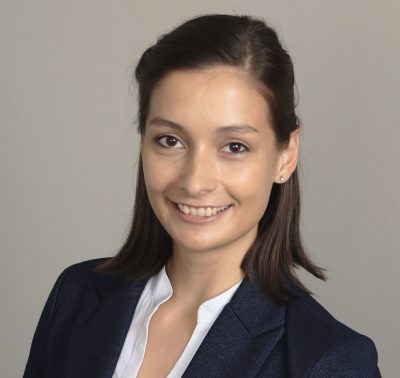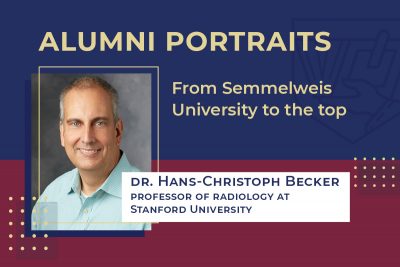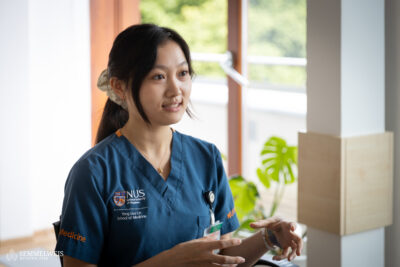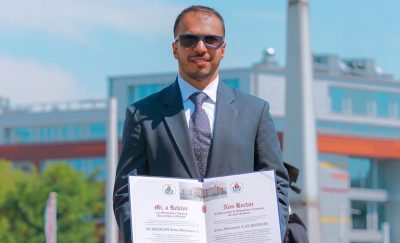Dr. Anna Kornafeld received her medical degree at Semmelweis University where she studied between 2010 and 2016. During her university years, she did TDK work at the Department of Pulmonology and the Department of Ophthalmology, and was active member of the Student Council. She has worked as a research assistant at the Intensive Care Unit of the Korányi National Institute of Pulmonology, as an emergency physician at the Szent Imre Hospital and at Oxy-Med Medical Ltd. She continued her research at the Mayo Clinic in Florida, USA, where she is currently doing the second year of her residency in internal medicine.
Why and how did you choose the United States as your workplace?
I’ve always been attracted to other people, languages, cultures, perspectives and ways of thinking. During my university years I had the opportunity to do several internships in the USA, Finland, Brazil and Germany. The fantastic people I met and the experiences I gained here motivated me to take the USMLE multi-stage exam series after graduation, which allowed me to apply for residency training in the USA. I was very impressed with the residency training system of this country, because of the competitive salary and many other factors. Programs also have to compete to attract residency candidates. In addition to the diversity of elective practices, there is also a strong emphasis on how the programme ensures the well-being of residents, how much time off or research time is given, how much “office” work is required, how much time is allocated to the study and practice of medicine, how much conference attendance is supported financially and in terms of time. And how the composition and frequency of the didactic lectures is, which take place during working hours, away from patient care. So while applying I put the internal medicine programme at the Mayo Clinic in Florida in the first place because they offered very attractive options for these questions. The fact that parasolvency is an unknown term in the USA, also strenghtened my decision to do my training here.
How did your family and your friends cope with this situation, especially during the pandemic? And how do they cope with it now?
My family and my friends helped me a lot. Without them, I don’t think I would be here today, they are a constant source of support. I started my vocational training at the end of June 2020, just in the middle of the pandemic, which was a daunting time for me. I remember asking myself day after day: how long will this last? How long can I not travel home? Will there be vaccination? When? What if I get infected too? Every resident knows that training time is full of questions. Although I wasn’t a resident outside of pandemic season, the biggest test of my well-being as a resident was the feeling of isolation: not knowing how long I could not travel home, how long I could not hug my family or see my friends in my limited free time. I remember that because of the time difference I used to call my mother at 5am on the way to work, when it was already 11am at home. Then I remember the euphoria of the vaccination. I had the first jab just at Christmas and the second on my birthday, which was the greatest present. After the vaccination I visited my family, which meant a lot. Since then we are trying to see each other regularly.
What specific knowledge did you acquire at Semmelweis University that you apply in your everyday life? What do you think the biggest advantage or disadvantage of your studies at Semmelweis is?
Semmelweis University provided me a very strong theoretical knowledge, which helped me a lot in preparing for the USMLE exam and still helps me today not only in active patient care and research, but also in education. I had extremely good teachers and mentors, such as Dr. Veronika Müller, Director of the Department of Pulmonology and Dr. Illés Kovács, Head of the Department of Ophthalmology. They have been indispensable in helping me to develop my research thinking, but also exemplary in their care and expertise towards patients. In addition, at the university I acquired a hard-working and independent work ethic, which is an asset in my current job. In the USA, I find that the clinical practice training of medical doctors is stronger than at home. Here, in the second part of their training, the medics are actively involved in all-day patient care in various practices: they follow several patients every day, document, present on rounds, and are the primary communicators with patients and families. Both patient care and the university, the doctors and residents of the future, can benefit from such practice-oriented clinical practice training.
What do you consider to be the biggest positive aspect of your current job that you would recommend for your home country?
I think education is more practice-oriented. Continuing the previous example, the clinical training is useful not only for medical students in the USA, but also for residents, as they are already practicing their role as educators during their first year of training. In my programme, during my internship in internal medicine, a team consists of one or two medical residents, two first-year residents, one second-year resident, one third-year resident and one specialist. Patients’ plans are set up by the second-year resident, the first-years and interns present on rounds to the third-year resident as a minor specialist and communicate with patients and their relatives. Education is shared between the senior residents and the specialist, the latter only supervising, but you are basically given a free hand and independent operation as a resident. As internal medicine residents we are also involved in general practice. From the first year onwards, we have a panel of about 80-100 patients, I am their GP, and I see them on the annual rounds in addition to acute rounds. This further increases my autonomy. We also have the possibility to rotate in acute clinics, free clinics, HIV clinics of universities in the area. Another positive factor is that they pay a lot of attention to the well-being of the residents.
When there is no pandemic, they organise regular programs for us. Even during the pandemic, we tried to meet online as often as possible, or in small groups outdoors. For research in my programme, we receive a lot of support, not only financially but also in terms of time: every year we get several weeks to focus on our research. We also get financial support for conferences and extra days off.
Why did you choose your current field? Do you plan to add another profession in the future?
During the university years, I was attracted to pulmonary medicine. To do that here, you first have to do the internal medicine residency, this specialized exam is the entry. In the meantime, intensive therapy also started attract me. I am very happy to have started my training in internal medicine, as I can now build a strong internal medicine-based mindset and professional foundation.
You also did a significant TDK work. What do you recommend students to focus on during their undergraduate years and what should they be involved in? How could you find a balance between your studies and your leisure time?
I think that during your studies it is important to find a balance between professional development, learning and relaxation. It’s not about getting a credit in a semester course, it’s about years of practice, trials and errors and learning from the mistakes. It helps a lot if we adopt a development-oriented approach rather than a perfectionist one. These years give also a great opportunity to learn about your core values, which can help you not only in your career choice. The university gives you more than just skills and contacts. Depending on our interests, we can test ourselves at a wide range of activities: patient care, research, education, awareness-raising, event management, software development, team building, social work, volunteering, cultural programmes, entertainment, sports, etc. We need to know what we are interested in and try it out actively while we are still at university. Let’s choose good mentors and ask lots of questions! As a Semmelweis student, you can meet a lot of excellent masters. Also, one of the most important pieces of advice is to take time for your loved ones, the people who cheer you on, without whom you would not be where you are today.
In the long term, it cannot be driven permanently. You need to study and work hard to become a good professional, but the only way to do this while staying healthy is to take time for yourself and relaxation along the way. Recharging means different things to different people. For me it means spending time with my loved ones, doing regular exercise and travelling. Exchanges are a great opportunity for professional development, to learn foreign languages effectively, to get to know other cultures, to build international friendships and contacts, to see the world and other perspectives.
It is not easy to find the balance during the university years, I felt most of the time it was an unfathomable mystery for medics. And that’s okay. After the demos and exams, there were always a few university parties with friends to celebrate the end of the study period, the hardships and the achievements. Afterwards, I usually relaxed with my family in the countryside before the next drive. It’s okay if you feel you can’t find your balance during your university years, it’s a normal, human feeling. Besides studying, take care of yourself, stop every now and then to relax, celebrate, spend time with your loved ones and your values, enjoy your university years. Looking back, I will miss them.
Alumni Directorate, Sára-Viola Fülöp
Translation: Rita Kónya
Photo: dr. Anna Kornafeld



